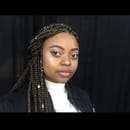I went to go see “The Hate You Give” last week, and it was amazing. It was one of the best movies I’ve seen in theater since “Straight Out of Compton.” I knew that it was going to evoke emotion, but I did not expect to cry. Anyone who knows me personally knows that it takes a lot for me to cry, and I had the water works twice during this film!
It was full of issues that are so important and pertinent to America today, especially for the Black community.
If you are black, you need to see this movie.
If you are black AND young, you need to this movie!
The main character Starr is a young Black teenager that attends a predominantly White private school. She lives with her mother, father, and brother in Garden Heights, which is a neighborhood that is predominantly Black with a lot of drug activity. She faces an identity crisis, noticing that she’s too Black for her school and too White for her friends at home. (I’m sure anyone who’s Black and attends a predominantly White college could relate this.) Suddenly a childhood friend is shot by a police officer after being pulled over on the road. After the footage is released, the world erupts, and Starr has two decisions: to be quiet or to be heard.
This dilemma is one that many Black students face in communities full of people that look nothing like them. As a student who is visibly very different from everyone else, there is a strong feeling to want to blend in. Not only does the color of our skin make us stand out, but what we do is put under a magnifying glass. Anything that is different labeled as ghetto or loud or just something typically of a someone who is Black. Speaking up about any political issues writes you off as an angry black person. In light of these assumptions and stereotypes, Black people might choose to remain quiet…to blend.
Starr was confronted with many reasons to be quiet. The movie starts with Starr and her brother getting a lesson from their father at a young age at the dinner table. He drills them to remember their rights, and to know what to do in certain situations. They got the talk that every parent has to have with their black children at a young age: Don’t go into a store without buying anything. Don’t put your hand in your pocket. Don’t walk around with hoodie. Don’t increase the volume of your voice. Don’t come off as a threat. Obey the law and be nice the policeman even if you calls you out your name. I remember the talk I had with my mom. I would always respond with a rebuttal: Well isn’t that unfair? Why do I have to pull over if I didn’t do anything? Why am I so scary? My mother or father answers saying that it’s just the way society is.
Although many Black children go through this training to survive a world where they are feared and seen as a threat, Starr makes the decision to fight back and speak up. She has a right to speak. Starr finding her voice is one of the most important parts of the film.
I think an important take away is that this an issue happening all around America. No one ever thinks it would happen to themselves or in their own community until it does. When I was young, I had a childhood friend, Zoe Dowdell. He was full of vibrance and energy that was so contagious. One day he was driving a car that police suspected for carjacking and robberies. Zoe didn’t pull over when the police wanted him to, and the police didn’t wait long to open fire in the car. My neighborhood erupted when people found out about his death. I was on campus when I found out, and I didn’t go to the funeral or the vigils because I couldn’t do it. I was angry, confused, and did not want to confront the tragedy that everyone mourned. I chose to be quiet. I chose to be silent. I didn’t want to think about how unjust the world was, and how terrible his death was.
Starr’s character had a great importance to me. She spoke out about what happened. It takes great strength and courage to do so, and it makes me think about what my voice can do. It serves as a reminder to anyone who is Black: Make sure your voice is heard. It is so very important to yourself, your community, and the world. Your voice can make a difference on step at a time.



